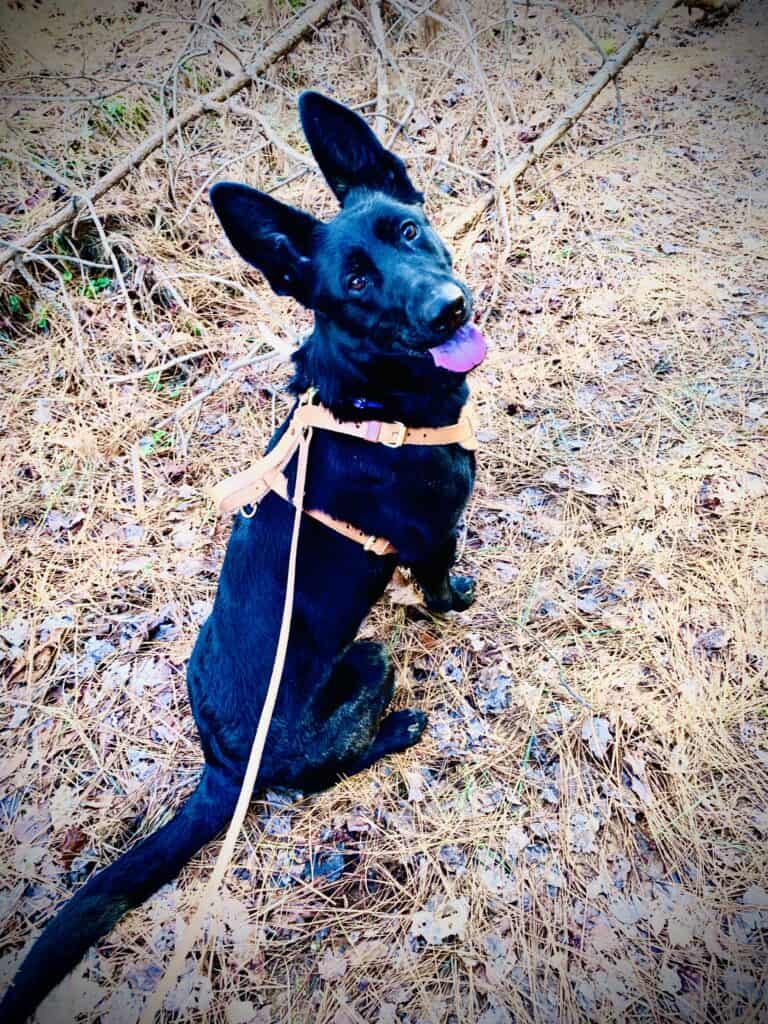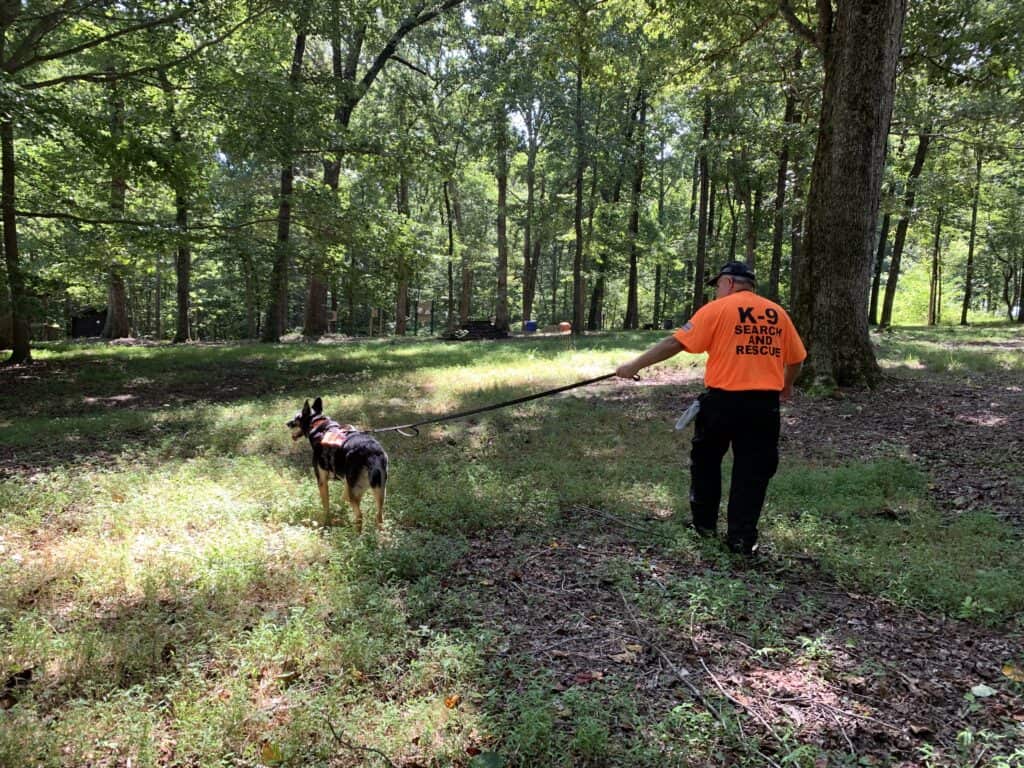Recent natural disasters like Hurricane Helene and the flooding in Texas have directed a great deal of attention towards the topic of Search and Rescue (SAR). While Human Remains Detection (HRD) dogs were deployed for the bulk of work during these disasters, live-find SAR dogs were also utilized in the early stages of rescue operations to help locate survivors.
The value of a well-trained SAR dog can literally be the difference between life and death – and the unfortunate reality of hurricanes, floods and other weather phenomena means they will almost certainly continue to be in high-demand. This has also led to an increase in well-intentioned civilians seeking to join in the efforts by training their own dog for SAR work. While many dogs do have a natural aptitude for olfactory related tasks, it is important to understand that there are a number of inherent traits which oftentimes determine which dogs will make good SAR K9s and which won’t. In this article, we will explore these traits in more depth so you can decide if your dog may be up to the challenge.
What do SAR K9s do?
Search and rescue dogs are trained to locate missing people. They can be trained to work in the wilderness or rural settings, in urban settings, on the water, in the snow, or in disaster scenarios.
Rescue teams are able to harness the incredible power of a dog’s nose to help to locate individuals trapped in the most heavily obstructed environments, even when they are buried under rubble or snow. They can identify victims underwater during recoveries, and clear hundreds of acres where a lost person is presumed to be. Organizations such as FEMA, emergency management, law enforcement, and civilian SAR teams can all be called upon to deploy with a SAR dog.
The work of a SAR dog is very demanding. The training process often takes several months or more to complete, building up from initial testing and ‘hot trails’ (in the case of live find K9s) to pushing the dog’s capabilities in challenging environments and lengthy, aged searches. Handlers must also be capable of reading their dog’s behavior indicating whether a search area is positive or negative. Since SAR work requires a dog possessing some key traits to be effective, a SAR dog trainer is often used to evaluate the potential suitability of a SAR K9 prior to embarking on the training process.
Important traits for a SAR K9
If you’re looking at your own dog and wondering if they are suitable for SAR work – or you’re considering pursuing this discipline with an upcoming addition – you will likely want to know which characteristics are desirable in a SAR dog candidate.
Stability
Your SAR dog needs to be reliable in all circumstances. As a large part of their remit is to come into contact with strangers, reactivity or anxiety around new people is a problem. How does your dog respond to new people? Can you trust them when you take them to a new environment? Do they spook when they hear loud noises without the ability to recover quickly? If your dog is confident, well-socialized and listens to instructions, you’re off to a good start.
Athleticism
Irrespective of whether your SAR dog is searching in confined urban areas or a spacious rural environment, they will need to be in good physical condition. They may have to navigate unstable terrain, deal with elevation changes, and wind their way through bushes and trees. To successfully navigate these surroundings, your dog must be agile. Medium and larger-sized breeds are typically more desirable for SAR work than smaller breeds, primarily due to their increased range of motion and ability to cover the search area in less time. Outright speed isn’t a necessity – but one major benefit of using a dog for SAR missions is that they are able to cover more ground in less time than humans.
Stamina
When you embark on a SAR deployment, you don’t know how long it will last, and you may not even know the precise details of the area that needs to be covered. A dog who sprints for 30 seconds but then tires rapidly is not usually an ideal candidate for SAR work. Instead, a dog who has relentless stamina and can search for prolonged periods without fatiguing is much more preferable.
Drive
Your dog may have all the physical characteristics required to be a SAR dog – but there is a huge inherent drive component to their work. Your dog’s natural drive to work is critical to their success as a SAR K9. This is more than just “my dog likes to sniff things out” – it means that they are actually willing to focus and engage on the task at hand, and persist with their work when the conditions are tough. Having a highly motivated dog will help ensure that they do not get bored, easily discouraged or distracted while searching.
Communication
A strong bond between handler and K9 is imperative in Search and Rescue. The dog must listen to instructions provided by their handler – both for the K9’s safety, and the safety of everyone involved in their search. The handler must be attuned to their dog’s behavior – sensing subtle changes of behavior and recognizing when the dog is (and isn’t) in odor could lead to a missing individual being located.
Health
This component is definitely something to bear in mind if you are considering embarking on SAR training with an older dog. With long searches that often take place over difficult and unpredictable terrain, SAR work is physically demanding. If your dog has a history of hip or elbow injuries, or suffers with health issues like respiratory problems, SAR deployments may be difficult for them.

Can you do SAR for fun, or do you have to deploy with a team?
Search and Rescue is a great activity for dogs and handlers alike – and it is certainly something you can do together as a hobby! SAR provides excellent physical activity and mental enrichment for your dog, and we have worked with several dog owners who simply wanted to get their dog involved in a new activity. Unlike some other dog sports (looking at you, agility…), there is no need to purchase lots of equipment to get started on your SAR journey, either.
In conclusion
Whether you’re simply trying to provide your dog with an outlet for their energy, or want to take SAR more seriously and eventually deploy with a team, Search and Rescue is an activity that is both fun and valuable. If you are in this for the long haul, taking the time to assess if your dog is a good candidate for the demands of SAR can set you up for success.
At Synapse Canine, we offer comprehensive working dog evaluations for SAR dog candidates, both in-person and virtually. We also help prospective SAR handlers who don’t have a dog yet find the right candidate. Working with an experienced SAR K9 trainer can help you assess your dog and exactly what they need to maximize their success in SAR work – something which will save a lot of time and potential frustration in the future. Contact us today for more details by calling or texting (336) 947-9240 or emailing info@synapsecanine.com.

